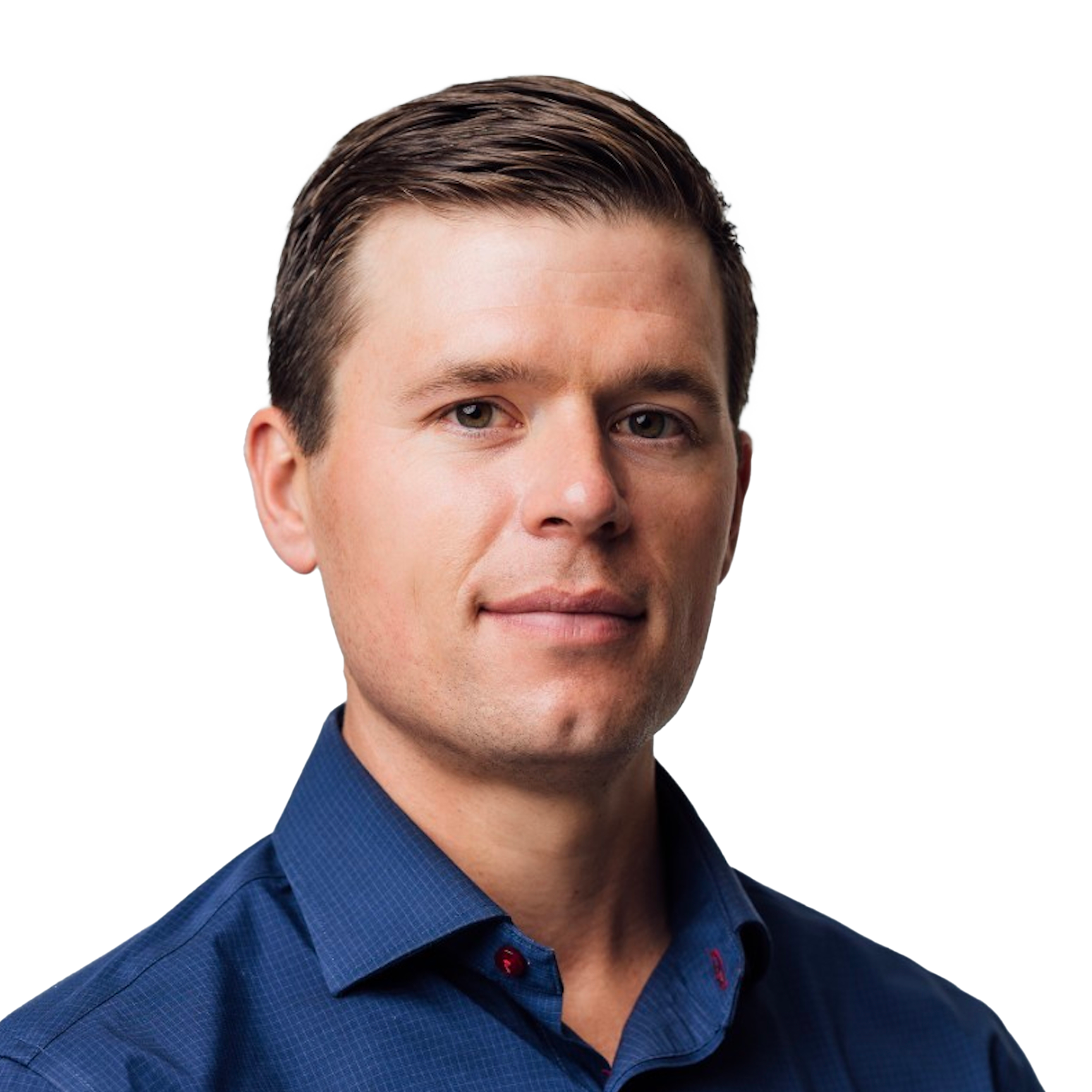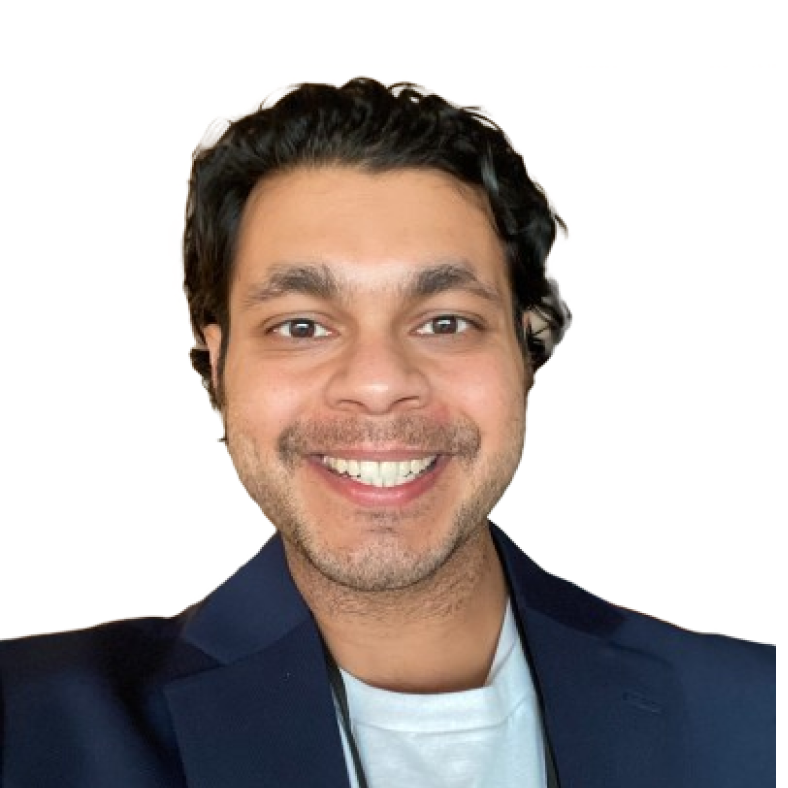
.png)
In this interview, Alina Vandenberghe, co-founder and co-CEO of Chili Piper, shares her journey from Romania to the US, her upbringing during communism, and the lessons in perseverance and collaboration she learned. She discusses the challenges and rewards of founding Chili Piper with her husband, emphasizing the importance of mutual respect and the ability to handle conflicts in such partnerships. Alina highlights her passion for innovation and culture, and the complexities of roles like marketing in a dynamic environment. She also shares her approach to handling competition, emphasizing collaboration over confrontation, and provides insights on personal growth, stress management, and maintaining company culture during expansion.
Podcast Transcript
Tracy (00:05.353)
Hello and welcome to Path to Growth, conversations with leaders on the go-to-market. I'm your host, Tracy Young, co-founder and CEO of TigerEye. Today's guest on the podcast is Alina Vandenberg, co-founder and co-CEO of Chili Piper. Alina, thanks so much for joining us. I'm excited to chat with you.
Alina (00:25.583)
Same, same very excited Tracy. We both have a husband co-founder. Both dressed in black, we have a lot of things in common.
Tracy (00:34.518)
So tell me about growing up. Tell me about mom and dad. Where were you raised? What did they do? What did you learn from them?
Alina (00:42.18)
I was born in Romania during communism and I came here in 2007 in the US. So I'm an import. My parents were factory workers and the things that I've learned a lot during my time in childhood is perseverance, grit, very long hours. I can grind more than most people. And...
Probably one of the most important things that I've learned as a child is that it takes an entire village to make things happen and the better you are at collaborating with others, the better likelihood of impacting positively the ecosystem around as well.
Tracy (01:30.197)
Yeah, I can't even imagine being seven years old. And I mean, do you remember, do you have memories of being seven and your parents telling you, hey, we're going to pack up our stuff and we're going to leave? Can you
Alina (01:42.387)
We actually, so during communism, we did not leave the country. I left by myself after I finished school without them. But I do have very vivid memories of the revolution in Romania, the communism time, the big brother aspect of communism, and the challenges that come with it, yes.
Tracy (01:51.903)
Mm-hmm.
Tracy (02:06.633)
What was the feeling? Was it, was it like fear? Was it anger from your memory?
Alina (02:17.56)
The one thing that I remember very strongly is the fear of speaking your mind because that was punished gravely. Any kind of criticism towards the existing government or existing politicians or any kind of complaining of any kind would be frowned upon, but even worse, you can get killed for it. So...
Alina (02:45.057)
There's a lot of baggage and drama there, yeah.
Tracy (02:47.857)
Yeah, yeah, my family, my parents were born in Vietnam as Chinese people because my grandparents left China because of communism and then Vietnam War happened and my parents got on a boat with their baby daughter, my sister and just left because they were not gonna raise their kids in a communist country because of fear. Yeah, and they're just like, you don't understand how good it is in America. I can say whatever I want and we're not fearful.
Alina (03:07.604)
Oh my gosh.
Tracy (03:16.685)
And this is like something they taught us early on. This is like, we've got police officers out here that we can trust and like a lot of trust for the police forces. Like you don't have to bribe them like you do in a communist country, right? So thank you for sharing that with me. So.
Alina (03:24.272)
Hehehe
Alina (03:31.696)
Mm.
There's a lot of resilience that's built on from that process, yes.
Tracy (03:39.893)
Yeah, so tell me about your current role or maybe just tell us about the story of Chili Piper.
Alina (03:47.235)
As you know me, I studied the engineering, computer science. I became obsessed with anything tied to computers because I felt it was so much easier to control a computer than anything else. And with that engineering mindset, I came here and I worked for various companies in product management mostly. I did sales as well. I worked for EdTech, FinTech.
Health tech I work for pretty much any industry you can think of Bloomberg Pearson and My husband kept asking me to use my product talent to start a company I kept resisting and he said look every time you build the product gets amazing adoption amazing engagement And you've managed to do it in any industry. There's a talent there. Why don't you use it to start a company eventually caved in? 2016 and We sold our house. We sold our car
didn't pay ourselves salaries for two years to build the company. It's been seven years now. In 2021 we got a billion dollar valuation. It's been a very wild ride in between and it still continues to be very wild. But I enjoy the intensity of it and the complexity of it for sure.
Tracy (05:02.769)
We both work with our husbands. I've chosen to co-founded a second company with them and we have three children together. So what is your advice to people who are considering working with their partners? The people that they love so much, they wanna build stuff with them. What's your advice to them?
Alina (05:10.069)
Oh my.
Alina (05:24.215)
I don't think it's for everybody. I know a lot of couples where this would probably destroy their marriage. It takes a certain kind of mutual respect and admiration. And that's extraordinary to be able to withstand the ups and downs of building a company. That's number one. And number two, it requires a very strong partnership
in terms of differences of opinion, if you have very different approaches to pretty much anything and you don't know how to solve that conflict, you don't have the tool sets to know how to negotiate and discuss when you have on the opposite spectrum of something.
Tracy (06:18.173)
Yeah.
Alina (06:19.019)
It's the conflicts that break boards, it's the conflicts that break all sorts of co-founders. And in between two married co-founders, it gets even more intense. So without those foundations that are very solid, it's impossible to start something with your significant other.
Tracy (06:35.357)
Yeah, I totally agree with that. Starting a company is hard, running a company is hard, relationships is hard, marriage is hard, and when you put it all together, it's complete chaos. But I think we are also examples that it's possible if there is a shared foundation of core values and basic tools for conflict resolution. What are you gonna do when, you know?
Alina (06:46.87)
Hmm.
Tracy (07:04.157)
when you disagree. And I think a clear delineation of responsibility is really important too. And I see that both of you guys are CEOs, so how does that delineation of responsibilities look like?
Alina (07:15.651)
We've been shifting responsibilities across the years, depending on what we discovered that we can make most impact. So at the beginning, I was the CEO, and he was handling all our go-to-market, so the sales, marketing, customer success. Afterwards, I gave birth to two little ones. I took a lesser role. I took only the product piece and the engineering piece.
After I finished with the babies, I came back full force in other departments as well. Right now, for instance, for the past 12 months I've been acting CMO. So we've been shifting along the ways on these parts.
Tracy (07:56.667)
Mm-hmm.
Tracy (08:03.429)
Yeah, yeah, yeah. You've worked in just about every part of the business at Chili Piper. What's your favorite role? You can do anything in the company, and as founders, you just have to fill in where you're going to make the most impact, as you said. But what makes you the most happy?
Alina (08:22.531)
I tend to gravitate towards innovation. For instance, right now I'm completely obsessed with AI autonomous bots. That's all I can think about. That's all I want to build. That's all I want to do. I also get obsessed with culture. And keeping the right kind of culture in a company is extremely important. Yes, if I was to pick my two, it would be innovation and culture. That would be it.
Tracy (08:47.639)
Mm-hmm.
Alina (08:52.303)
my current endeavor for the next 12 months.
Tracy (08:57.629)
It's such a, such a CEO mindset. So tell me about Chili Piper's culture and how did it change as your team grew over the years?
Alina (09:06.067)
In my mind, culture is everything in a company because it permits to the people that you hire and the people that you hire are what are gonna make or break the business. And it's very hard to drive those values, especially in a remote environment when you have 40 different cultures and you have people in 40 countries. And things are...
means so many things to so many people. And you can take things out of context, you can apply things in a certain way and you think that that's what it means to exhibit a particular value that's important to us. And as a result, the way I look at it is that if myself, I reflect the values that are important for our culture through actions and not through words, then those things will permeate.
It requires a certain amount of exposure for every single one of the new employees to fully understand what's important to pay attention to versus what's not.
Tracy (10:16.189)
Yeah, it sounds to me that you really walk it like you talk it. You want to make sure that you're leading by example. And it's so true, like every person that comes in changes the culture in a way. And it sounds like it's important for you to show and represent the culture that you want to see for each of your employees. How do you preserve that as the culture grows?
Alina (10:46.295)
I've observed that around 100 employees or so, things have shifted a lot. When we were smaller, it was a lot easier because I would interact with a lot of our employees and I would have a lot of conversations and I would always reinforce the values and the culture. Around 100, I don't know why that happened, that specific size, actually around 110-ish, I immediately became aware of that.
a palpable shift. I was no longer the colleague per se, like I used to feel. I used to feel like a colleague to them, to being the figure that would be representative of both good and the bad, because on the bad front, because you have the, at least that's how the employees see a CEO.
as the one who makes a decision that can impact their roles, even though the reality is that it's their manager and it's the system, but that's how they view you. So with that power comes a lot of responsibility in how you start having those conversations. And the part that becomes a lot more important is the ability to communicate things clearly, especially when things don't happen as they should.
And I observed that there was a shift in how the communication had to happen and the way my language had to evolve to be able to withstand that growth and that culture at scale.
Tracy (12:23.921)
Yeah, we saw the same thing at my last company when we grew to 150 people. And you hit Dunbar's number and suddenly we, as a species, we just can't understand more than our own group of 150. Beyond that, you can't remember everyone's, for sure can't remember everyone's last name, let alone their first name. So suddenly it's like, is this my team member or not? And there's these weird dynamics, natural dynamics that happen. And then as you said, communication.
is so easy early on when you're 20 people in a single room, you just yell out loud and everyone hears it. Suddenly when you're 100 people, and I think it's a factor of hierarchy, right? 150 people, you're like leading maybe eight people, those eight people are leading eight people a piece, and then maybe there's another fourth layer. And so that's four levels away from you, four degrees away from you. And I just think...
Alina (12:57.704)
Yeah.
Tracy (13:16.989)
things get lost in translation often. And so as you said, that clarity of communication so that everyone understands the direction that you want to go is so important. So you're in this interim CM role, and you've written about how different marketing seemed from the outside compared to how it is on the inside. Can you talk more about that? Like, tell us about how
Like what do people not understand? What do founders not understand about marketing and sales? What do they get wrong about marketing and sales?
Alina (13:55.977)
Would you mind repeating the question for some reason you broke out a bit?
Tracy (14:01.745)
Yeah, sure thing. Um, you've recently written a lot about marketing and how it's seems different from the outside compared to how it is on the inside. And you're obviously got a perspective on marketing, especially being in the role right now. Can you just tell me more about what do founders get wrong about marketing and sales?
Alina (14:26.92)
I found marketing one of the hardest roles that I've ever had. Even though I've been managing engineering teams, I've been managing product development, I've been doing sales, customer success. The reason why I'm finding marketing the hardest is because it requires a very broad number of skills to get it right and it constantly changes because whatever is effective in one quarter is no longer effective in a different quarter. And a lot of...
its success is dependent on things that are very hard to fully grasp. So, for instance, the concept of a brand is highly tied to culture and is highly tied to how your customers perceive you from different touch points. And then you look at distribution. Distribution is very hard to nail predictably because markets change a lot and
what can be effective in one corner loses effectiveness in the next quarter because certain things, whenever something works, everybody copies it and then no longer becomes effective. So I found marketing the hardest, even though from outside it looks like the easiest. One assumes that marketing is about creating swag and landing pages and putting ads or writing on social media. But the reality is that it's a lot more
nuanced and getting to a place where you have language market fit in addition to product market fit, you resonate well to the audience in all the possible channels at scale. If you have multiple personas and multiple products, it becomes really, really complex. I enjoyed the challenge for the past 12 months a lot.
Tracy (16:16.789)
I've never heard that term before, language, market fit. Tell me more about that.
Alina (16:22.287)
Because I come from the product world, I constantly think about product market fit and minimum viable product and how to create engagement and how to create adoption. That's what I've been focusing for the most part of my career. What I discovered in marketing is that it's the equivalent of that is language market fit, which is how well are you resonating to your audience so that you get them to take action. And it becomes very complex because
Tracy (16:29.994)
Yeah.
Tracy (16:48.383)
Right.
Alina (16:52.443)
humans are complex and especially if you have multiple personas in a buying committee what's going to resonate to everybody it will differ and how you communicate with each one of them will differ even more so depending on what stage of the process they are understanding what problem educating to the specific specifics of the problem to the point where they actually want to take action it's fascinating process for me
Tracy (17:17.145)
It is, it's both a bit of art and a bit of science. I mean, you have enough conversations and you start recognizing the patterns and the words that are resonating with specific profiles and which buyers. And as you said, it's just the humans make it complicated because there's so many different profiles. There's so many different roles. There's so many different personalities within those roles. So one thing might resonate with this group, but one thing might not resonate as well because of, you know, their own.
their own character and their own traits. And then I think competition definitely makes everything just, you know, everything change. Because competition changes, market changes, and suddenly the terms you were using one day doesn't work the next. I mean, we saw this again all the time, maybe after running a company for 10 years. It is hard, you know what? I'm gonna have to give my CMO a big hug when I see him.
Alina (17:56.517)
Yeah.
Tracy (18:15.989)
This job is really, really hard. And I always joke that this is the group that just spends money, right? Like you're just going to ask me for more budget. Okay. Switching gears a little bit. Competition in this space is so fierce. One, because it's a gigantic TAM. There is a lot of people involved here. There's a lot of technology solutions, incumbents and startups. And.
Just how, I guess how do you think about differentiation and competition in this market?
Alina (18:52.407)
I'm smiling because we were kind of, I think, the only company that I know of that for the first six years of our existence, five years of our existence, we had zero competitors, which one would assume that it's a great thing that you don't have competitors because you go to market and people just choose you. But the reality is that when you don't have competitors, people are not aware that they have a problem and they need to solve for it. So our greatest enemy was inaction. And
If I look at inaction as a competitive threat, it is a real threat, but it's a very different approach to educating your customers on what's important and what's not. Now that we have some of ankle biters and some people that have started to copy our features, I'm observing that they educate the market, so the market is faster to translate to action, which is a good thing to happen. But as an entrepreneur, I don't have yet the muscle formed to...
completely respond to the messaging that competitors have. So for me, it's new, it's been like a year and a half or so that I'm looking into it. I'm very, I'm approaching it very differently than probably most entrepreneurs in that I'm by nature very collaborative instead of being very...
I don't know what's the opposite of it, where you're going against with force to have a negative impact on others. It would come to me that way. But because I'm very collaborative, for instance, I invited a competitor to a customer dinner. I'm finding that.
Eventually, the market appreciates the ones that don't punch. I'm observing that the market appreciates that there is a collaborativeness and understanding that there's big pie, there's big pie for everybody. And the goal is to have obviously a positive impact on the business and on the numbers, but also on the ecosystem. And there's enough, there are enough hard things in the world to just throw punches like that.
Alina (20:58.103)
I don't know that it's that healthy in the ecosystem.
Tracy (21:04.409)
You are a very collaborative and friendly...
capitalist because Like you've worked it's clear to me you've worked incredibly hard you've had this tremendous success and The Reputation that your product and your culture is positive even from my point of view, right? So I think you're doing a lot of really good things and I'm so happy to have you on this podcast for our listeners to learn from
Alina (21:12.795)
I don't know if it's good long term. I have no idea if it's good long term.
Tracy (21:37.573)
It's just so funny because as you're talking, I'm literally thinking in my head, man, I tell our team that we are in a fist to fist combat and we are in fist to fist combat every day for eternity as long as we want this company to exist. So I think it's just different in terms of just how we see the market.
Alina (21:58.939)
I don't think there's right or wrong. I don't think there's a right or wrong approach. It's just, obviously this kind of competitiveness fires up people and even if you look at athletes, this fire to beat the other is what energizes them. And I completely understand that. It's just that in my nature, I'm finding that I just operate differently and that's part of the culture.
Tracy (22:02.325)
Great, I agree with that.
Tracy (22:14.909)
Yeah.
Tracy (22:23.081)
Yeah, it's really cool. I admire you for that. It's really cool hearing you say that. Okay, let's switch gears again. What advice would you give to Alina, yourself, 10 years ago?
Tracy (22:42.709)
So this is before you founded the company.
Alina (22:44.375)
Mmm.
Alina (22:51.515)
probably to lean in a lot more when things are very hard for me in whatever stage of the journey I am in, whenever things are very, very hard to lean in to ask for more help to solve for those moments. Because whenever I observe an
Right now, whenever I observe a knot in my stomach or like a body sensation when I'm having a conversation, I'm observing it and like making a note, okay, it seems that something was triggered here in that conversation. I want to understand why and why do I have like that response in my body that was a negative one. Because whenever I do, whenever I have a strong body impact, that's probably my biggest opportunity for growth. And I know that's what's going to...
unlock the next level in my personal development. And in the past, I have not done that consistently. And I think I would have developed a lot faster if I did, if I would have a coach around that would give me advice on the type of things that are triggering to me or the type of things that are harder to unlock than other things. If I would have understood the power of coaches and the power of support of people around me.
early on when things are tough, I think I would have grown even faster.
Tracy (24:21.837)
Yeah, it's like in our natural instincts to not want to go to where it hurts. It's like, let's just ignore this, especially for me as a young founder. When I was a young founder, it was like, this thing hurts. I'm just gonna do these other 20 things and just ignore that. But that was exactly the wrong instinct because what was the hardest and what hurt me the most and what gave me stomach pains and made me sick to my stomach was exactly the thing that I should have worked on. These other 20 things didn't matter.
Alina (24:45.659)
I'm sorry.
Tracy (24:50.645)
And then as you said, asking, just like being able to remove ourselves from our own egos and being able to ask for help, because it is very, very hard to find product market fit, to scale a business, to lead a team, to have, I think you said twins at one point, to have twins. Yeah. Okay. So like to have, yeah, to have, and it sounds like they're close in age, to have twins.
Alina (25:09.207)
And I have two boys. And then they're not twins, but yeah.
Tracy (25:17.797)
become a parent for the first time, become a mom, and still try to juggle everything. It's taken me almost 40 years to raise my hand and ask for help, and I ask for help all the time now because this journey is just way too hard if I'm not getting help.
Alina (25:25.647)
laughs
Alina (25:32.228)
Yeah, we tried to toughen it up and say, I can't handle it, I can't do anything. And then we realized like, shit, I cannot do everything.
Tracy (25:37.627)
Yeah.
Tracy (25:41.365)
Mm-hmm. How else do you handle pressure? I mean, you've got your company, you've got big plans for your company, you've got your family, you're crazy enough to start a company with your husband. There's constant pressure. And I'm sure like just like me, I just feel like you get punched in the face enough and it's like, all right, I just got punched in the face again. I've survived the last hundred times, it's gonna be okay. But I do feel the pressure.
Alina (25:57.264)
Mm-hmm.
Tracy (26:10.645)
Constantly to a point where sometimes I do wake up like gasping for air at 1 a.m. In the morning or 2 a.m. In the morning, how does Alina handle stress? Any any tips for me?
Alina (26:15.371)
Mm.
Alina (26:22.223)
So I'm noticing that...
The pressure doesn't stop, right? It's not that if you reach certain size or certain financial success, the pressure stops. It's forever there.
Tracy (26:38.245)
It only gets harder. This is what founders don't know. It only gets, the more success you have, the harder it gets.
Alina (26:43.408)
The problems get a lot more complex in their nature because they have a bigger impact. So every decision has a lot more ripple effects than smaller decisions in the past, right? And
As a result of the...
our ability to push through those moments where it's tough, it's what matters the most. For me, what keeps me energized and have this infectious belief, positive belief throughout the day is a reminder of the positive impact that I can have with the company that I've built.
I've removed the financial burden because we had the secondary in 2021. So I no longer have to fight for my existence for survival. And our company is also in a place where we were cash positive and we're growing. And so the fact that I have. Mental. Separation from the financial part helps me right now a lot to focus on the right things, but even if I would not have that, if I would not have that safety on financials.
The ability to see five years or 10 years from here on my positive impact, it's what allows me to, at any point in time, create pathways to that positive impact, as opposed to seeing all the possible things that are gonna be a detractor in the past. And whenever I get bad news, and I get bad news of maybe like one customer that was very dear to me that's churning or whatever might happen, I tend to look at it as a small, short-term obstacle. I put it in a box in my head.
Tracy (28:17.341)
Mmm.
Alina (28:29.815)
I say, okay, thank you Box for showing me something that I need to do better. I'm going to delegate that to someone else to create a solution for it right now. But I don't get bogged down with a short headwind. I really look at that long-term impact and what I can do to get there. So my mind stays focused on the bridges to create as opposed to the small ripple that are creating some little wind on the way. That's what
have been a work for me.
Tracy (29:01.053)
Yeah, I really love hearing that. It sounds like one, it's a perspective thing. It's being able to really zoom out and not let the small stuff bring you down and to see the bigger picture of where you wanna go and to have a clear idea of where you want your future to be and to laser focus on that. Then all the little things that come your way, I mean, either you're gonna handle it or pass it to someone else, but I think that's excellent advice.
Um, this has been a really great conversation. I'm so excited to meet you in person at some point and continue this, but thank you so much for joining us today.
Alina (29:31.163)
Hi. Thank you, Tracy. I think that I might see you in San Francisco at the road shows, it seems, maybe. And we can continue the conversation. I'm excited to hear from you as well, since you've been longer than me.
Tracy (29:49.757)
Thank you so much for joining us.

.png)













